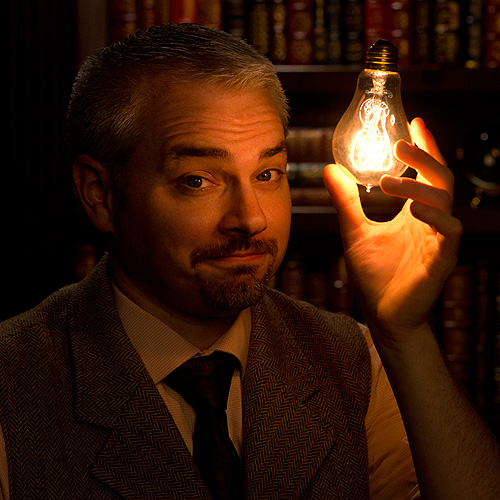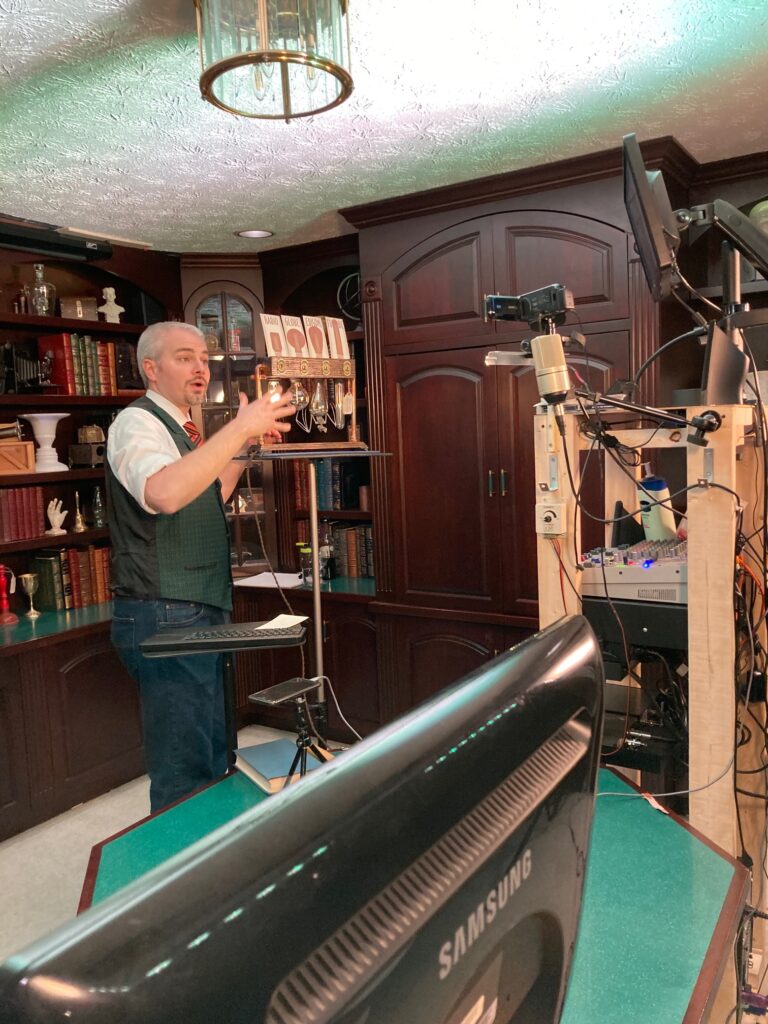If Peter Wood is doing his job well, you’ll never notice what he’s doing. It should look effortless and natural, smooth and, well, magical.
As a magician with 20 years of experience, Wood ’06, theatre, has learned that a successful way to fool a willing audience is to have the magical moment occur in a participant’s hands. Now he’s been given the chance to attempt to deceive the premier magical duo—Penn & Teller—on their hit show Fool Us.
The common aim of the magicians featured on the show, now on it’s seventh season, is simple: can you trick the kings of tricksters? Wood brings his act to the episode Teller Gets Smashed, airing Friday, January 29 at 9 p.m. on the CW.
The devil is in the details
For his performance, Wood needed a time period-appropriate table to showcase his illusion, steeped in the Vaudeville, turn-of-the-century universe Wood creates in all his shows. And he needed to easily check the table as luggage on his way to Las Vegas.
As his magician persona, “Collector of the Impossible,” Wood creates storied backgrounds for all his tricks, fantastical fictions to reel the audience into his alternative, magical reality. What’s behind the scenes is a skilled craftsman with a well-stocked workshop who references century-old tomes to inform his magical practice. But this table was the first piece designed with Southwest Airlines guidelines as his primary parameter.
The final creation—a slender, cross-legged varnished table with brass fixtures and a drawer—fit the bill and succeeded in playing its role as the scene-setting prop holder. This level of attention to detail, in addition to his magic trick, earned Wood his favorite compliment to date—Penn told him that his trick could have fit into magic shows from a hundred years ago.
An infatuation with secrets
Wood, who started performing at age 10—receiving a lot of attention for his age—became adept at magic skills before he even knew the meaning of stage fright. “I’m thankful I started young enough that by the time I started to have any doubts and fears, I had enough flight time to have the legitimate confidence that what I was sharing was worth people’s time.”
He built on those early skills by working in various magic shops, honing his abilities during downtime in the stores and later in informal sessions with fellow performers. In the past two decades, Wood has established a career entertaining and mystifying companies and families in the Delmarva region.
“The typical magician that you think of is either telling you that they’re doing trickery, or they are playing the part of a person who has magical powers,” says Wood. “In my career, I want to explore the second one, but I don’t have magical powers. I just have things that I’ve collected that can do amazing impossible feats.”
Unfortunately, Wood’s magic holds no sway over a global pandemic, so like many other entrepreneurs, he’s had to improvise a few new tricks to pivot to an online format. “Usually, at my shows, the magic happens in someone else’s hands and now that’s gone. Because if the trick happens in my hands and you’re watching it on a screen, then you’re going to assume that I’m just controlling it,” shares Wood.
Now, he utilizes the chat to ask when to stop shuffling a deck or he requests feedback on what page number to flip to in a book. This allows the audience to participate, but also partner with Wood in making the magic happen.
But even online, Wood faces the same conundrum as other performers—making intricate tricks appear effortless through practice and repetition. “Magicians are infatuated with secrets,” says Wood. “And unlike a juggler who you can see juggling five balls and appreciate the skill they put into learning that, I have to work so hard to hide that skill, to make it look like I’m not doing anything at all.”
Practical magic
Behind his standing desk he uses as a virtual stage are tall, dark wood paneled shelves, books etched in gold leaf, a Ruben vase, a wooden box, an old Coke bottle that can fit a half dollar in, but not out. Wood’s cabinet of curiosities develops the aura of his trade and gives his new online audiences a pleasant respite from their normal Zoom meeting rooms.
Wood’s online dinner shows have their upsides and downs, he says. He’s able to entertain guests well outside his usual Baltimore–D.C. circuit, but he loses out on their valuable reactions—not only gratifying to a performer, but necessary for knowing what tricks are successful and which ones need more work, or the ax.
Wood cites UMBC’s theatre’s production manager and technical director Gregg Schraven ’97, theatre, as his guide to knowing when and what to discard—not necessarily his tricks—but even more foundational but difficult professional knowledge. How much wood is useful to keep on hand? How many different light fixtures are actually necessary for taking apart and repurposing? This hands-on knowledge is invaluable, Woods says.
UMBC also led Wood to develop his AutoCAD skills to design and craft specific and unique items. In his theatre tech role as a student, he was tasked with creating parts and props for other students’ visions, allowing Wood to work outside his more steampunk aesthetic and widening his creative comfort zone.
“And unlike a juggler who you can see juggling five balls and appreciate the skill they put into learning that, I have to work so hard to hide that skill, to make it look like I’m not doing anything at all.”
—Wood
Another UMBC connection Wood owes quite a lot to? His brother, Matt Wood ’13, financial economics, M.P.P. ’15, and a maintenance manager in Residential Life. As the younger Wood, Matt has been the stagehand and assistant for many shows, being “grandfathered in” to other long-standing gigs, says Wood, like their past 20 years of performing at the Howard County Fair.
Sharing his collection of impossible things
In his act on Fool Us, Wood presents a portrait painting to Alyson Hannigan, the show’s host. The portrait’s subject is missing its eyes, but whoever is looking through the parchment is gifted X-ray vision, Wood shares, building the story arc like he built the table and the other props. Through Wood’s magic, Hannigan is able to make out the color of four pieces of cloth inside four different little coin envelopes.
The act is emblematic of Wood’s repertoire. “Here’s what I do,” he sets the scene. “I collect items like this, and they don’t just work for me. Let me demonstrate.”
Whether or not Wood fooled Penn & Teller is revealed on the show, but Wood says he walked away from the experience with so much joy and satisfaction. “Literally everyone on the production—all the way up to Penn & Teller—just wants you to put your best foot forward and have it be as good of a showcase as possible for you. That definitely took a lot of the nerves and butterflies away.”
Ultimately on Fool Us, Wood was complimented on what he hopes his everyday audiences never notice at all. “Penn & Teller could see the sort of process that I went through to create the method, to create the secret, and they appreciated the work.”
*****
Header photo courtesy of Peter Wood ’06.



